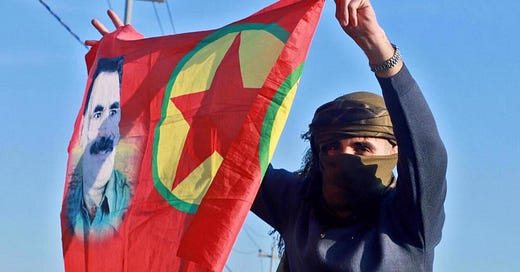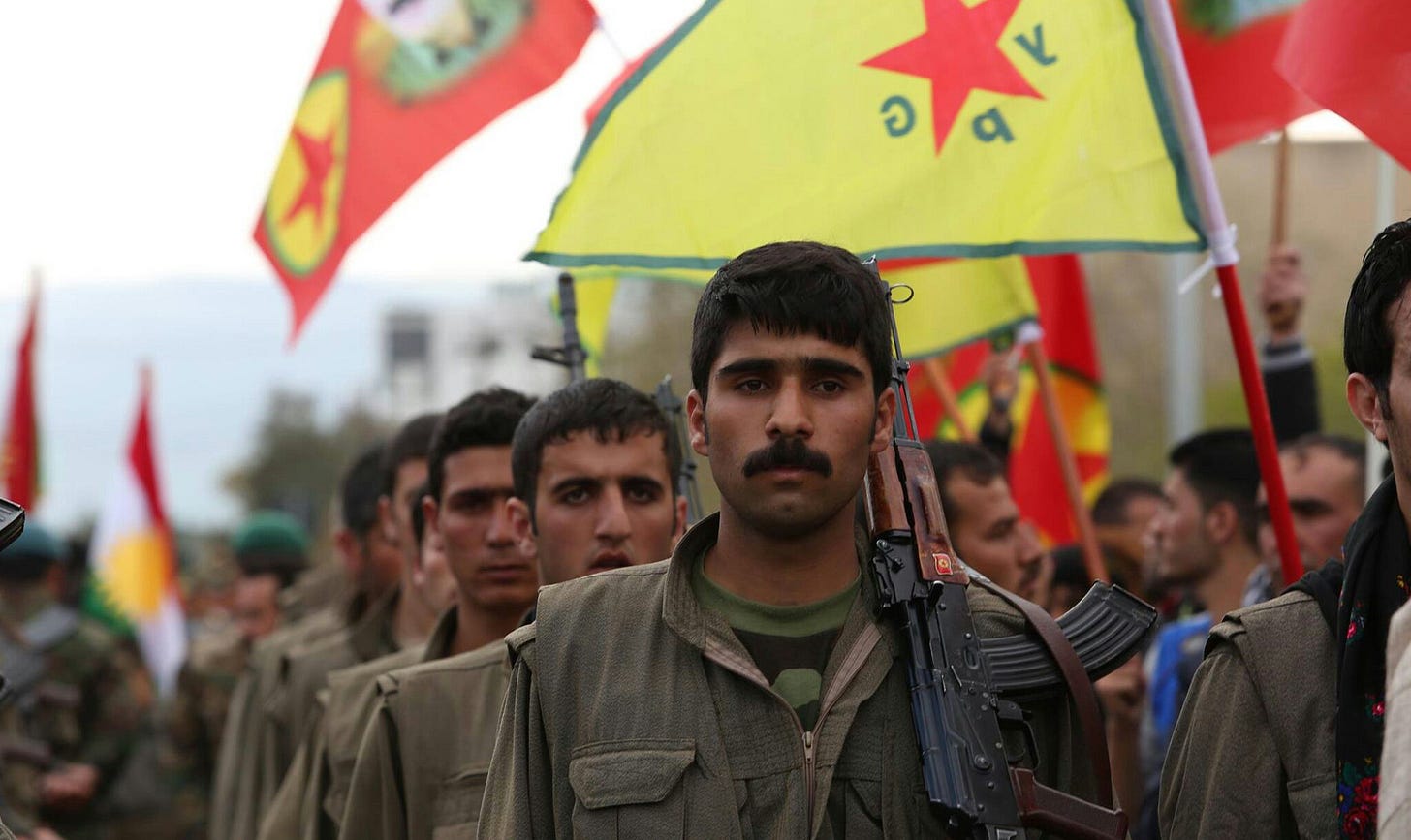Trial Balloon: The Future of PKK-Türkiye Relations
After 46 years of armed struggle against Türkiye, the PKK dissolves itself, a strategic move testing Ankara's willingness to reciprocate as Erdogan maneuvers toward constitutional change for 2028.
The world-famous Kurdistan Workers' Party (also known as «Partiya Karkerên Kurdistanê» or PKK) has announced its dissolution after nearly half a century of guerrilla warfare against Türkiye. The decision was made at a party congress held in early May in northern Iraq. The group's leadership decided that the Kurdish issue "must henceforth be resolved by peaceful and democratic means".
The news itself was not a surprise. Rumors of the imminent liquidation of the PKK began to circulate back in February, when the party's permanent leader Abdullah Ocalan, who has been serving a sentence in Türkiye since 1999, made a video address. In it, he called on his supporters to stop the armed struggle against Ankara, as "dangerous and inappropriate." Less than a week later, in early March, the Kurdish guerrillas took the first step and unilaterally decided to cease fire.
However, even in such conditions, part of the expert community considered the talk about a quick end to the confrontation between the PKK and Türkiye to be “naive optimism”. First of all, because Ocalan had called on the PKK to lay down its arms at least twice already — in 2013 and 2015 — but to no avail. The third “public approach,” made under pressure from Ankara, also did not promise an immediate result.
In addition, the increased friction between the Kurdish militias of Syria and the Turkish contingent also affected the mood of the PKK. Turkish intelligence reported that some guerrilla commanders were ready to open a “second front” – especially if the pro-Turkish government of Syria tried to carry out ethnic cleansing against the Kurds. Therefore, experts expected that the attempt to decide to end the struggle would take place at the congress “with a fight,” and the discussions would end in nothing. The reality turned out to be more prosaic: the PKK Congress did not oppose the will of the founder and voted to dissolve itself. A line was drawn under the guerrilla struggle with Türkiye.
Recep Tayyip Erdogan's political ambitions played a significant role in freezing the conflict between the Kurds and Ankara. The current Turkish leader is preparing for the 2028 presidential elections, and the key problem for him is not so much his increasingly popular opponents as bureaucratic obstacles. Erdogan has reached the "limit" of presidential terms, which can only be jumped by changing the constitution.
Even taking into account that the presidential Justice and Development Party (Adalet ve Kalkınma Partisi, AKP) and forces loyal to it control more than half of the seats in parliament, this is not enough to confidently pass all the procedures. It is necessary to secure the support of part of the opposition camp, including pro-Kurdish parties. It was also important to “pacify” the latter because in the conditions of confrontation with the PKK, any attempts by Erdogan’s group to strengthen its power would be perceived with hostility.
It is also important to consider that the PKK's decision to disband itself after 46 years of struggle turned out to be a "trial balloon" designed to test the reaction (and honesty) of its counterpart. The Kurdish public is expecting reciprocal steps from Ankara, including, in addition to the release of Ocalan, an amnesty for activists, as well as an end to the persecution of political cells and parties.
The position of the pro-Kurdish forces was expressed by the co-chairman of the Peoples' Democracy and Equality Party, Tuncer Bakirkhan. He emphasized that until that day, the "Kurdish threat" was explained by the existence of a guerrilla movement opposing the country's authorities. With its liquidation, "there is no reason left not to build a democratic Türkiye." Considering that Bakirkhan's party is one of the three largest parliamentary opposition forces, this statement can be considered as a readiness of some of Erdogan's opponents to cooperate with him.
For their part, the president's entourage is trying to emphasize at every opportunity that they will not disappoint the Kurds' expectations. Thus, AKP MP Shamil Tiyar said that the authorities are working on a deal under which about 300 PKK leaders and activists will be released from Türkiye to "third countries" (for example, Norway). Another 4,000 or so rank-and-file PKK members fighting in Northern Iraq will be gradually accepted through a "green corridor" on the border; in the future, they will be guaranteed protection from prosecution for armed struggle against Ankara. Tiyar emphasizes that such steps should facilitate the accelerated integration of yesterday's guerrillas into civilian life.
However, there are plenty of people in high offices in Turkiye who are looking for a catch in the PKK's peaceful solution. The voices of Turkish "hawks" are loud - although the main concerns are publicly expressed mainly by influential retirees.
Among them, for example, is the developer of the famous doctrine of Turkish naval defense (“Blue Homeland”), Rear Admiral Cihat Yayci. Commenting on the decision of Ocalan's supporters, Yayci stated that the PKK is only a small (albeit well-known) part of the "dangerous underground" and its public self-dissolution is not enough to remove the "Kurdish threat" from the national security agenda. Moreover, the Kurdish "People's Protection Units" operating in Syria, which are considered in Türkiye to be the "Syrian branch" of the PKK, have not made any public commitments.
The squabbles that remain outside the public part of the congress are pushing the "hawks" to make pessimistic forecasts. Not all PKK field commanders were satisfied with the decision to disband without preconditions. Some even considered it an attempt by Old Man Apo (as Ocalan is called in the ranks of the organization) to bargain for a pardon.
Apo himself also raises concerns. Since he has de facto not taken part in the transformation of the PKK since 1999 (while remaining a living symbol of the movement), his influence on the real course of the guerrillas has diminished over time. And any attempt by Ocalan to return to his previous positions is fraught with “palace coups” and the transition of some PKK followers to other Kurdish paramilitary groups.
At the same time, Ankara looks to the future with cautious optimism and is determined to carefully “pick the keys” to yesterday’s opponents. Because the stakes are higher than ever. If the steps taken by the authorities suddenly do not coincide with the aspirations of yesterday’s supporters of the PKK, President Erdogan’s political multi-move will be at risk of failure.
About the Author: Dr. Leonid Tsukanov holds a Doctorate in Political Science and is an esteemed expert with the Russian International Affairs Council. As an international journalist and Orientalist, Dr. Tsukanov specializes in analyzing the intricate dynamics of global security and Middle Eastern affairs. In 2022, he was awarded the prestigious G.M. Evstafiev Award for young specialists in international security and nuclear non-proliferation (PIR Center). In 2023, he won the competition for international journalists in the category of "Best Analytical Article on International Issues" (RIAC/Union of Journalists of Russia). He has authored several books and published over 100 scholarly and analytical articles, focusing on contemporary security challenges facing nations in the MENA region.








Thank you for the detailed depiction of Turkish-PKK nowadays dinamics. The current political development in Turkey is somehow related to the Syrian regime change and the future kurdish role in it. I will be very greatful, if someone with an in-depth understanding connects both timelines. Thanks!
That's awesome.